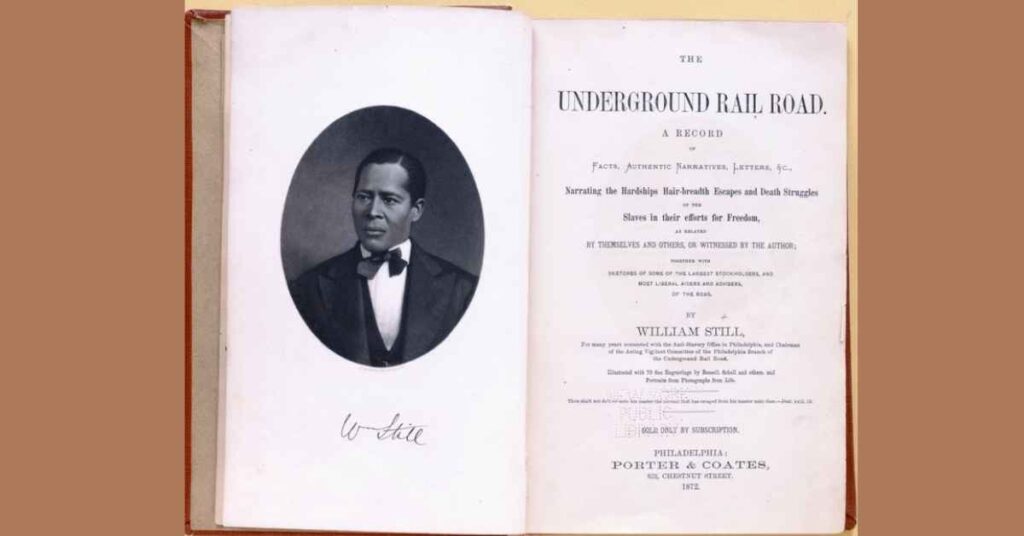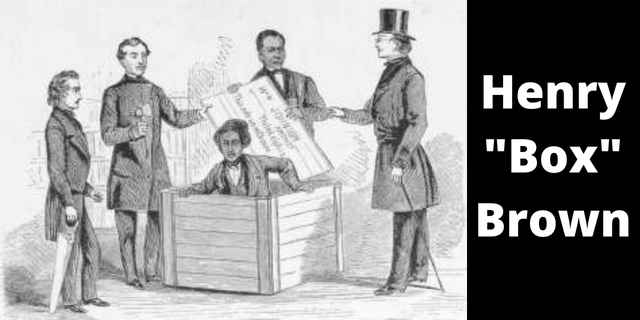This is an excerpt from The Underground Railroad by William Still. It concerns the escape of Henry Brown who mailed himself to freedom in a box.
Henry Brown was born circa 1815 and lived in slavery in Virginia. In 1849, he arranged with the help of friends to be transported by wagon, steamboat, and train to the Philadelphia Vigilance Society (part of the Underground Railroad).
The story became famous when Henry Brown published the account of his escape.
It’s fair to say that some abolitionists, notably Frederick Douglass, were unhappy that Brown had revealed all the details of his method. This made it more difficult for others to repeat it.
Excerpt – Henry Box Brown

Although the name of Henry Box Brown has been echoed over the land for a number of years, and the simple facts connected with his marvelous escape from slavery in a box published widely through the medium of anti-slavery papers, nevertheless it is not unreasonable to suppose that very little is generally known in relation to this case.
Briefly, the facts are these, which doubtless have never before been fully published…
Brown was a man of invention as well as a hero. In point of interest, however, his case is no more remarkable than many others.
Indeed, neither before nor after escaping did he suffer one-half what many others have experienced.
He was decidedly an unhappy piece of property in the city of Richmond, Va. In the condition of a slave he felt that it would be impossible for him to remain.
Full well did he know, however, that it was no holiday task to escape the vigilance of Virginia slave-hunters, or the wrath of an enraged master for committing the unpardonable sin of attempting to escape to a land of liberty.
So, Brown counted well the cost before venturing upon this hazardous undertaking. Ordinary modes of travel he concluded might prove disastrous to his hopes; he, therefore, hit upon a new invention altogether, which was to have himself boxed up and forwarded to Philadelphia direct by express.
The size of the box and how it was to be made to fit him most comfortably, was of his own ordering. Two feet eight inches deep, two feet wide, and three feet long were the exact dimensions of the box, lined with baize.
His resources with regard to food and water consisted of the following: One bladder of water and a few small biscuits.
His mechanical implement to meet the death-struggle for fresh air, all told, was one large gimlet.
Satisfied that it would be far better to peril his life for freedom in this way than to remain under the galling yoke of Slavery, he entered his box, which was safely nailed up and hooped with five hickory hoops, and was then addressed by his next friend, James A. Smith, a shoe dealer, to Wm. H. Johnson, Arch street, Philadelphia, marked, “This side up with care.”
In this condition he was sent to Adams’ Express office in a dray, and thence by overland express to Philadelphia. It was twenty-six hours from the time he left Richmond until his arrival in the City of Brotherly Love.
The notice, “This side up, &c.,” did not avail with the different expressmen, who hesitated not to handle the box in the usual rough manner common to this class of men. For a while they actually had the box upside down and had him on his head for miles.
A few days before he was expected, certain intimation was conveyed to a member of the Vigilance Committee that a box might be expected by the three o’clock morning train from the South, which might contain a man. One of the most serious walks he ever took—and they had not been a few—to meet and accompany passengers, he took at half past two o’clock that morning to the depot.
Not once, but for more than a score of times, he fancied the slave would be dead. He anxiously looked while the freight was being unloaded from the cars, to see if he could recognize a box that might contain a man; one alone had that appearance, and he confessed it really seemed as if there was the scent of death about it.
But on inquiry, he soon learned that it was not the one he was looking after, and he was free to say he experienced a marked sense of relief. That same afternoon, however, he received from Richmond a telegram, which read thus,
“Your case of goods is shipped and will arrive to-morrow morning.”
At this exciting juncture of affairs, Mr. McKim, who had been engineering this important undertaking, deemed it expedient to change the programme slightly in one particular at least to insure greater safety.
Instead of having a member of the Committee go again to the depot for the box, which might excite suspicion, it was decided that it would be safest to have the express bring it direct to the Anti-Slavery Office.
But all apprehension of danger did not now disappear, for there was no room to suppose that Adams’ Express office had any sympathy with the Abolitionist or the fugitive, consequently for Mr. McKim to appear personally at the express office to give directions with reference to the coming of a box from Richmond which would be directed to Arch street, and yet not intended for that street, but for the Anti-Slavery office at 107 North Fifth street, it needed of course no great discernment to foresee that a step of this kind was wholly impracticable and that a more indirect and covert method would have to be adopted.
In this dreadful crisis Mr. McKim, with his usual good judgment and remarkably quick, strategical mind, especially in matters pertaining to the U.G.R.R., hit upon the following plan, namely, to go to his friend, E.M. Davis,A who was then extensively engaged in mercantile business, and relate the circumstances.
Having daily intercourse with said Adams’ Express office, and being well acquainted with the firm and some of the drivers, Mr. Davis could, as Mr. McKim thought, talk about “boxes, freight, etc.,” from any part of the country without risk.
Mr. Davis heard Mr. McKim’s plan and instantly approved of it, and was heartily at his service.
Resurrection Of Henry Box Brown
“Dan, an Irishman, one of Adams’ Express drivers, is just the fellow to go to the depot after the box,” said Davis.
“He drinks a little too much whiskey sometimes, but he will do anything I ask him to do, promptly and obligingly. I’ll trust Dan, for I believe he is the very man.”
The difficulty which Mr. McKim had been so anxious to overcome was thus pretty well settled.
It was agreed that Dan should go after the box next morning before daylight and bring it to the Anti-Slavery office direct, and to make it all the more agreeable for Dan to get up out of his warm bed and go on this errand before day, it was decided that he should have a five dollar gold piece for himself.
Thus, these preliminaries having been satisfactorily arranged, it only remained for Mr. Davis to see Dan and give him instructions accordingly, etc.
Next morning, according to arrangement, the box was at the Anti-Slavery office in due time. The witnesses present to behold the resurrection were J.M. McKim, Professor C.D. Cleveland, Lewis Thompson, and the writer.
Mr. McKim was deeply interested; but having been long identified with the Anti-Slavery cause as one of its oldest and ablest advocates in the darkest days of slavery and mobs, and always found by the side of the fugitive to counsel and succor, he was on this occasion perfectly composed.
Professor Cleveland, however, was greatly moved. His zeal and earnestness in the cause of freedom, especially in rendering aid to passengers, knew no limit.
Ordinarily he could not too often visit these travelers, shake them too warmly by the hand, or impart to them too freely of his substance to aid them on their journey. But now his emotion was overpowering.
Mr. Thompson, of the firm of Merrihew & Thompson—about the only printers in the city who for many years dared to print such incendiary documents as anti-slavery papers and pamphlets—one of the truest friends of the slave, was composed and prepared to witness the scene.
All was quiet. The door had been safely locked. The proceedings commenced. Mr. McKim rapped quietly on the lid of the box and called out, “All right!”
Instantly came the answer from within, “All right, sir!”
The witnesses will never forget that moment. Saw and hatchet quickly had the five hickory hoops cut and the lid off, and the marvellous resurrection of Brown ensued.
Rising up in his box, he reached out his hand, saying, “How do you do, gentlemen?”

The little assemblage hardly knew what to think or do at the moment. He was about as wet as if he had come up out of the Delaware.
Very soon he remarked that, before leaving Richmond he had selected for his arrival-hymn (if he lived) the Psalm beginning with these words: “I waited patiently for the Lord, and He heard my prayer.”
And most touchingly did he sing the psalm, much to his own relief, as well as to the delight of his small audience.
He was then christened Henry Box Brown, and soon afterwards was sent to the hospitable residence of James Mott and E.M. Davis, on Ninth street, where, it is needless to say, he met a most cordial reception from Mrs. Lucretia Mott and her household.
Clothing and creature comforts were furnished in abundance, and delight and joy filled all hearts in that stronghold of philanthropy.
As he had been so long doubled up in the box he needed to promenade considerably in the fresh air, so James Mott put one of his broad-brim hats on his head and tendered him the hospitalities of his yard as well as his house, and while Brown promenaded the yard flushed with victory, great was the joy of his friends.
After his visit at Mr. Mott’s, he spent two days with the writer, and then took his departure for Boston, evidently feeling quite conscious of the wonderful feat he had performed, and at the same time it may be safely said that those who witnessed this strange resurrection were not only elated at his success but were made to sympathize more deeply than ever before with the slave.
Source
The Underground Railroad by William Still was published in 1872.
The book is in the public domain. It can be found in the Library of Congress.
A Similar Escape
Henry Box Brown wasn’t the only slave to escape with this daring method. Another fugitive arrived in Philadelphia by box and was helped there by the Underground committee.
You can read the account in our excerpt on William Box Peel Jones in the Underground Railroad.